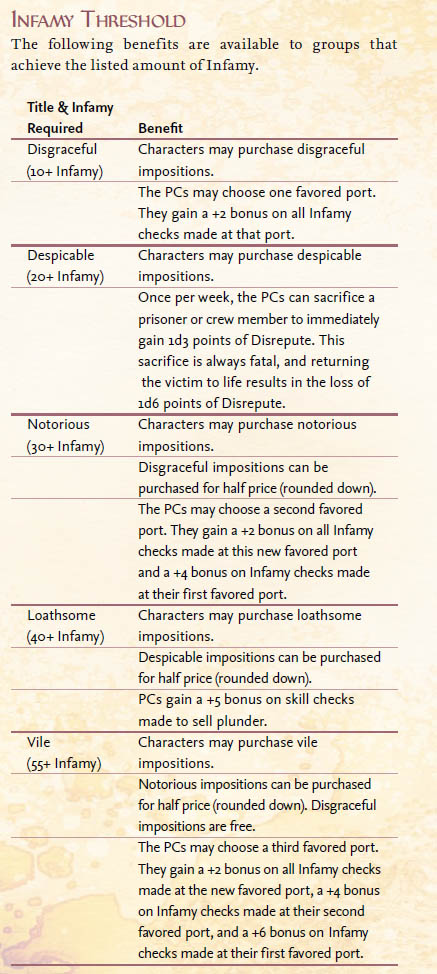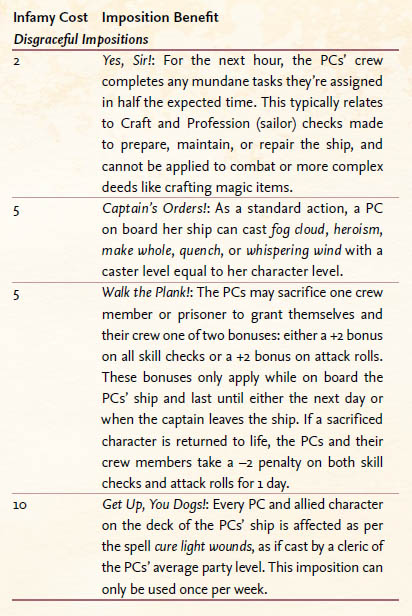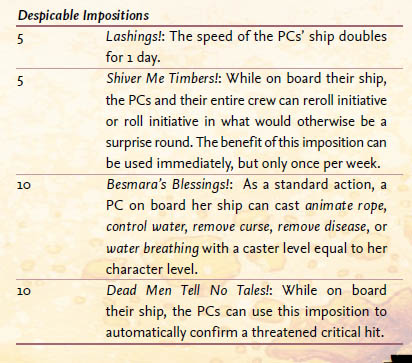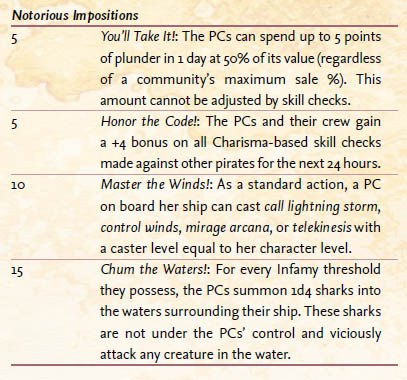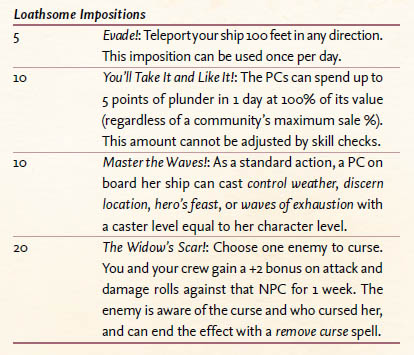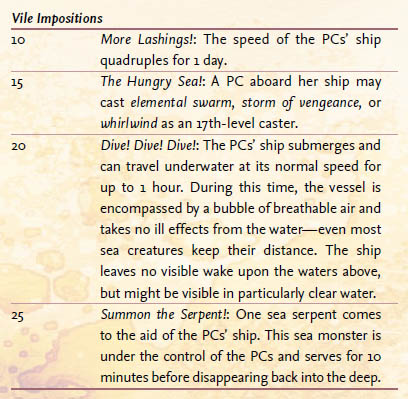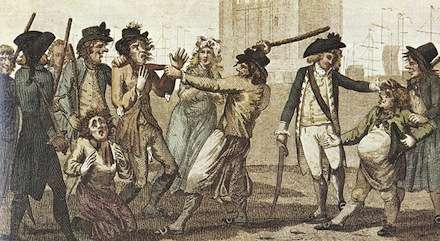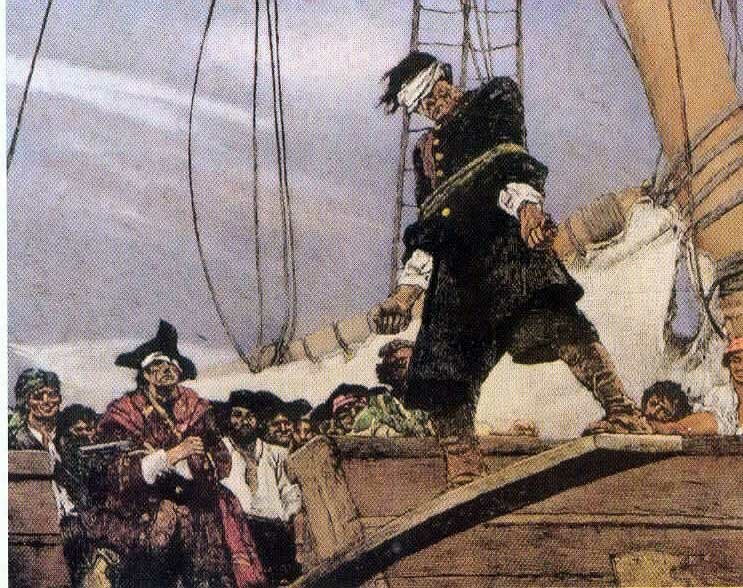 Infamy and Disrepute
Infamy and DisreputeSome pirates only do what they do for the promise of wealth, being little more than brigands of the waves. Others do it for the reputation, fearsomeness, and power that comes with numbering among the most notorious scallywags on the seas. That's where Infamy comes in. Numerous times over the course of their careers, the PCs as members of a single pirate crew
will have the opportunity to recount their victories, boast of the treasures they've won, and spread tales of their outrages. All of this has the potential to win the PCs Infamy, but that alone isn't the goal. At the most basic level, infamous pirates have the potential to press gang unfortunates into their crews, get repairs to their ships in nearly any port, and win discounts from merchants they'd prefer not to rob. As a crew becomes more and more infamous, however, its legend stretches across the seas, allowing it to garner support from other pirate lords, win more favorable vessels, and even rally whole pirate armadas under its flag. This system allows characters to track how their legend is growing over the course of the campaign, along with providing them tangible rewards for building appropriately piratical reputations.
Infamy and Disrepute Scores: In a method similar to the tracking system for Fame and Prestige Points detailed in Pathfinder Campaign Setting: Pathfinder Society Field Guide, a party has two related scores, Infamy and Disrepute. Infamy tracks how many points of Infamy the crew has gained over its career think of this as the sum of all the outlandish stories and rumors about the PCs being told throughout the Shackles. Infamy rarely, if ever, decreases, and reaching certain Infamy thresholds provides useful benefits and allows others to be purchased using points of Disrepute. Infamy is limited by actual skill, however, and a group's Infamy score can never be more than 4 × the PCs' average party level.
Disrepute is a spendable resource - a group's actual ability to cash in on its reputation. This currency is used to purchase impositions, deeds others might not want to do for the group, but that they perform either to curry the group's favor or to avoid its disfavor. This score will likely fluctuate over the course of a pirate crew's career and can go as high as the group's Infamy (but never higher), and at times might even drop to zero. This isn't something to worry about, though, as a low Disrepute score has no bearing on a crew's overall reputation - on the contrary, it merely means they're making use of the benefits their status has won them. However, it does represent that even the PCs' legend can only take them so far, and if a group's Disrepute drops lower than the Disrepute price of a benefit, the crew must spend time building its Disrepute back up before it can purchase that benefit.
Winning Infamy and Disrepute: A few things are required to gain Infamy: an audience, a deed to tell about, and a flair for storytelling. Proof of the group's deed in the form of plunder doesn't hurt either.
To gain Infamy, the PCs must moor their ship at a port for 1 full day, and the PC determined by the group to be its main storyteller must spend this time on shore carousing and boasting of infamous deeds. This PC must make either a Bluff, Intimidate, or Perform check to gauge the effectiveness of her recounting or embellishing. The DC of this check is equal to 15 + twice the group's average party level (APL), and the check is referred to as an Infamy check. If the character succeeds at this check, the group's Infamy and Disrepute both increase by +1 (so long as neither score is already at its maximum amount). If the result exceeds the DC by +5, the group's Infamy and Disrepute increase by +2; if the result exceeds the DC by +10, both scores increase by +3. The most a party's Infamy and Disrepute scores can ever increase as a result of a single Infamy check is by 3 points.
If the PC fails the Infamy check, there is no change in her group's Infamy score and the day has been wasted. Occasionally, deeds of exceptional daring or depravity might win a party increases to its Disrepute. This sort of discretionary bonus to Disrepute is noted in the context of an adventure or determined by the GM.
Infamy and Disrepute per Port: No matter how impressionable (or drunk) the crowd, no one wants to hear the same tales and boasts over and over again. Thus, a group can only gain a maximum of 5 points of Infamy and Disrepute from any particular port. However, this amount resets every time a group reaches a new Infamy threshold. Thus, once a group gains 5 points of Infamy and Disrepute in Quent, it can gain no further points of Infamy from that port until it reaches the next Infamy threshold, though the crew can travel to another port and gain more Infamy by boasting to a new audience.
Plunder and Infamy: Plunder can modify a PC's attempt to gain Infamy in two ways. Before making an Infamy check for the day, the party can choose to spend plunder to influence the result -any tale is more believable when it comes from someone throwing around her wealth and buying drinks for the listeners. Every point of plunder expended adds a +2 bonus to the character's skill check to earn Infamy. The party can choose to spend as much plunder as it wants to influence this check - even the most leaden-tongued pirate might win fabulous renown by spending enough booty.
Additionally, if a PC fails an Infamy check, the party can choose to spend 3 points of plunder to immediately reroll the check. The party may only make one reroll attempt per day, and spend the plunder even if the second attempt fails - some people just aren't impressed no matter how much loot you throw at them.
Spending Disrepute: A group's Disrepute can be spent to buy beneficial effects called impositions, though some impositions might only be available in certain places - such as at port- or might have additional costs - like forcing a prisoner to walk the plank. Spending Disrepute to purchase an imposition requires 1 full day unless otherwise noted. When Disrepute is spent, the group's Disrepute score decreases by the price of the imposition, but its Infamy (and, thus, the group's Infamy threshold) remains the same. The prices of impositions and the Infamy threshold required to make those impositions available are detailed below.

